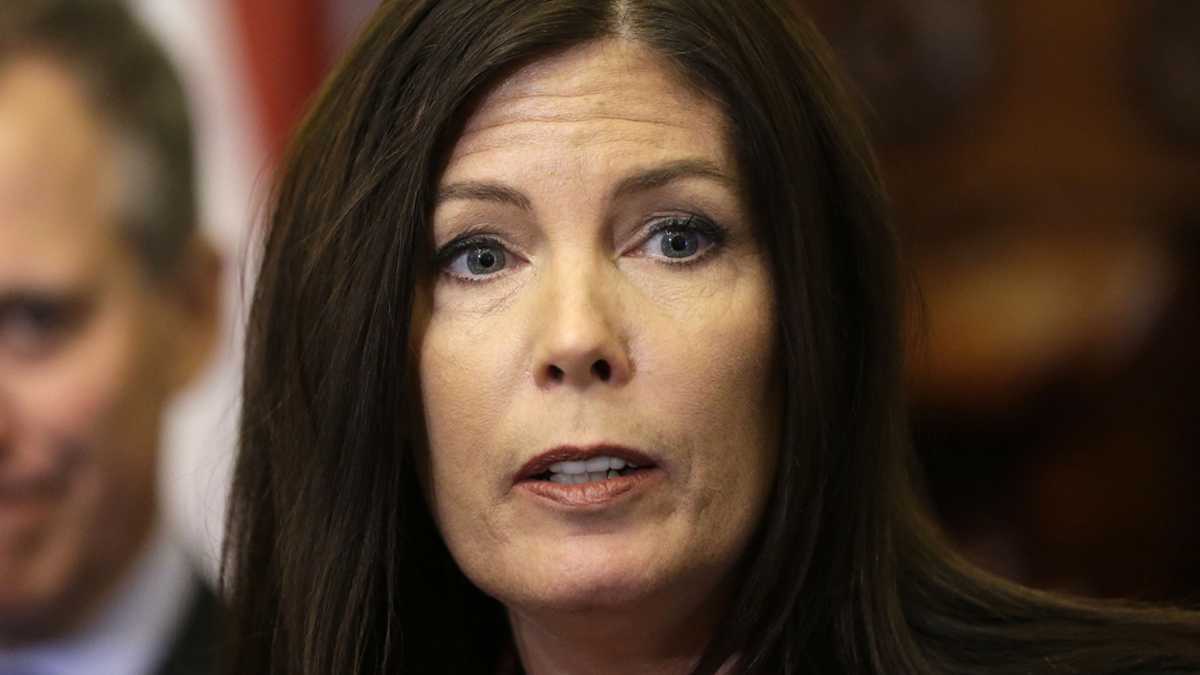Former prosecutor doesn’t buy Kane’s case
Listen
Pennsylvania Attorney General Kathleen Kane (Matt Rourke/AP Photo, file)
A former prosecutor who’s handled state and federal cases says that much of Pennsylvania Attorney General Kathleen Kane’s case that she couldn’t have pressed charges in a corruption probe she inherited is simply bogus.
Meanwhile Kane, who showed up with a lawyer and wouldn’t talk to the Inquirer last week, got on the phone with me to defend her handling of the case. I’m left a little skeptical about parts of her argument, but on the whole puzzled about the still-roiling controversy over the sting operation she shut down when she came into office.
To recap, Kane came out with guns blazing last week after the Inquirer reported that she killed a secret investigation in which a lobbyist caught in a jam was set up with a wire and ended up recording at least four lawmakers accepting cash. Kane insisted the probe was a nonprosecutable mess, relying on a tainted witness who’d already gotten a get-out-of-jail free card and had no incentive to deliver the goods.
She said the case was terribly managed, that it lacked standard investigative procedures such as subpoenas and interviews, and that other prosecutors had reviewed the material and agreed with her decision.
It was a pretty convincing performance, but I wondered about parts of her argument. She said, for example, that because the lobbyist/informant, Tyron Ali, was the only person who could testify as to who was on the recordings, he wouldn’t be a credible witness, and prosecutors might not even get the tapes into evidence at trial.
“Because of the rules of evidence, if you can’t lay the foundation, then the judge will not allow that evidence to come into court,” Kane said in her news conference.
I wondered about that, and called George Parry, a defense attorney who in the past has prosecuted plenty of cases using confidential informants. He said Kane’s argument was “bogus.”
“All confidential informants have low credibility — that’s part of the job description,” Parry said. “But you could certainly have the supervisor or investigator testify that on such and such a date at such and such a time, we wired up the informant, we sent the informant into whatever location it is.'”
I asked Kane about that, and she said the problem was deeper with this informant because, days before she took office, prosecutors had withdrawn a host of charges against Ali. That removed the incentive for him to come to trial and be an effective witness.
Parry said he doesn’t buy that either.
“You can always subpoena the informant. You can always reinstitute the charges,” he said. “You can do any number of things to compel the attendance of the informant at trial.”
Maybe she’s right, though?
On the other hand, there are a host of things that go into a prosecutor’s decision whether to proceed, and, over the years, I’ve seen plenty of investigations that came to nothing. Even if you think a crime was committed, if it’s not a case you’re likely to win, you have to think long and hard about committing the time and resources it takes to go to trial.
Then, on Sunday, the prosecutor who’d managed the probe, Frank Fina, weighed in with an open letter defending his reputation and challenging Kane to appear with him in front of the media to debate the controversy surrounding the case.
Fina, who’s now with the Philadelphia district attorney’s office, is a prosecutor with a solid reputation for bringing public corruption cases against Republicans and Democrats.
I asked Kane if she’d be up for a joint media appearance with Fina to clear the air.
“I frankly don’t see what the purpose of that would be,” Kane said. “If Mr. Fina has valuable information that he feels something should be done with, then he should do it. He has concurrent jurisdiction in the Philadelphia district attorney’s office.”
Through a spokeswoman, Fina declined comment.
Who is the judge?
There’s one other curious element to the dispute. Kane told me she’s limited in what she can say about the case by two judicial orders — a “gag order” preventing public discussion and a “sealing order” barring dissemination of documents about the case. She said she got permission to talk about the case before she held her news conference last week.
“The gag order was lifted for the limited purpose of allowing me or any of the other parties involved to talk about certain limited instances — for example, why we were not able to prosecute the case,” she told me.
And who brought the matter before the judge? And what judge, I asked.
“I can’t tell you that because it’s all sealed,” she said. “It’s under the sealing order as well as the gag order.”
Kane said she couldn’t say whether she was the one who sought the gag order.
More to come on this, no doubt.
WHYY is your source for fact-based, in-depth journalism and information. As a nonprofit organization, we rely on financial support from readers like you. Please give today.


